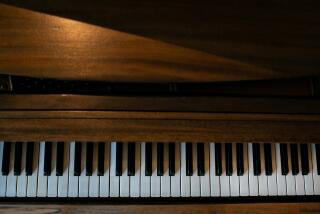To The Sitar Born : Shubho Shankar’s 2nd Career Turns Out to Be His First Love
- Share via
Shubho Shankar was the last of the three musicians to walk onto the wooden stage and sit cross-legged on the floor. He picked up his sitar, tightened a string or two and flashed a thousand-watt smile that lit up the dark auditorium.
Shyam Kane tapped on the tabla drums, and Rajeev Taranath strummed the sarod. But it was Shankar, the local musician, now the local boy, whom who many in the Cerritos audience had come to h1700885038 Shubho Shankar these days plays for audiences numbering in the hundreds or even fewer. Some performances have little or no advance publicity and garner no reviews. Yet he is happy to be pla2036952679 Shankar, now 47, clerked in a liquor store for a while and pushed boxes up and down aisles in a warehouse. He painted pictures and drew illustrations for telephone directories. But after turning 40 he heeded destiny’s call--and his father’s plea--and picked up the sitar again.
And as summer turned to fall this year, he filled his passport with visas, packed his suitcases and his sitar and hit the road for a monthlong concert tour of England, Europe and India.
The trip was filled with both physical and psychological baggage. Though middle-aged, he views himself as an “apprentice” musician. A husband and father of two children, on this trip he has been known primarily not for that but as “the son of . . . “ But the problems are also opportunities, in this case the chance to play with his father, Ravi, the world’s best-known sitar player and the one who brought the instrument to the attention of the West.
Shubho Shankar has lived for more than a decade in Garden Grove, one of 5,000 “Asian Indians” in Orange County counted by the census of 1980. He gives lessons in sitar playing, singing and flute in the county, San Diego and Los Angeles.
And each year, when his father tours, he joins in for a few concerts, performances that draw not hundreds but thousands, sometimes tens of thousands.
“My very first concert in my life was in Carnegie Hall,” he recalled over lunch in a Garden Grove restaurant. It was a 1971 performance entitled “Fathers and Sons,” with his father and tabla players Alla Rakha and his son, Zakir Hussein. The quartet journeyed across the country, playing in concert halls for mixed audiences of Indian music aficionados and newcomers lured by Ravi Shankar at Woodstock two years earlier.
For Shubho Shankar, that first journey to the United States was an eye-opener, especially Los Angeles.
“I loved the Sunset Strip,” he said of the fabled boulevard that was one of the centers of West Coast music. His father’s friends urged him to meet Americans of his own age, and he did, finding people in their 20s forming musical groups, sharing new ideas, wearing tie-dyed jeans and passing around marijuana. He remembered a new acquaintance’s shock when he rejected a joint: The man had never met anyone his age who did not smoke marijuana.
His father had a house in Hollywood in those days, and Shubho Shankar accepted the suggestion that he stay there. An art student in India, Shankar continued his studies here and received a degree from the Otis Art Institute of Parsons School of Design in Los Angeles. He married too, a North Carolina-born woman who stuck it out in Los Angeles even after they emerged from a Westwood movie theater on their first date to find their car had been stolen.
Although he met his wife, Linda, at a concert at Whittier College at which he played, the sitar soon went into the closet, replaced by his other loves; the paintbrush and drawing pen.
As a child attending an upper-class private school in New Delhi, Shankar won prizes for his art, including one presented by India’s prime minister, Jawaharlal Nehru.
“Art was a big thing to me,” he said.
If his drawing talent was one reason for not throwing himself wholeheartedly into the sitar, another was a desire to avoid inevitable comparisons to his father. The biggest disadvantage of being the son of a celebrity is constantly being compared to the parent, Shankar said: “You almost lose your (own) identity.”
But he quickly added that “the biggest advantage . . . is at least people are ready to give you the first break without any questioning. Whereas a lot of other people have to go to the back” to start.
“The bottom line is if you know your skill, and you have worked on it, and if you can prove it,” you can succeed, he said.
“So I think we as the children of celebrities have more advantages than disadvantages.”
As he nears 50, Shankar appears at ease with himself, a man who knows who he is and who is willing to gamble on a new career.
He said that after years away from the sitar, four years ago he listened to his father’s suggestions and urgings and decided to earn his living from the instrument. At first, he tried to juggle old job and new, hanging on to his work illustrating telephone directories for an Anaheim company while sandwiching in musical practices and performances.
Company officials were at first enthusiastic about having a potential star in their midst, “but when they saw what happened to my productivity” because of his time away from work to practice and play, they were not as happy, he said.
They suggested he pick his job or his music; he chose the music.
His wife works as a computer operator, which brings in money, and Shankar said that with his teaching and his concerts, he is able to make do.
He originally settled in the county because in the early 1970s it provided an affordable place to raise a family and was close to Long Beach, where he planned to continue his postgraduate studies. The academic life got pushed aside, but the family stayed on in Garden Grove.
Today his son is an avid baseball fan, and both children are interested in Indian music. Shankar said he wishes he had more time to help them develop that interest.
Ravi Shankar said from London between performances, “It’s very hard to talk about your own son, but considering that he left for almost 11 or 12 years and didn’t touch the sitar, and all of a sudden he took it up again--and with renewed zeal--I feel very proud of him.”
To play after so long away from an instrument “is a very, very difficult job,” he said, “but he has tremendous willpower, and he is doing it. He has done quite well, considering” the long layoff.
Shubho Shankar’s musical roots are as deep as they come. His father, now 69, was schooled first in Paris, then, from age 16, with Allauddin Khan in India. Fellow students included sarod player Ali Akbar Khan and Khan’s sister, Annapurna.
Ravi Shankar eventually married Annapurna, who continued her own musical career and became one of India’s most famous musicians.
While he was given time as a child for his art, Shubho Shankar said that in his teen-age years his mother “put a wall around me” and gave him a strict musical upbringing, tutoring him during his father’s frequent absences. Eventually, his parents divorced, and both later remarried.
An advantage of the concert tour of India is a planned reunion in Bombay with his mother, whom he has not seen in several years, Shubho Shankar said. He sees his father more frequently, but admitted to nervousness when they perform together.
In a hotel room, the two will discuss what they will play and rehearse briefly, “but as we get ready to go up the stairs to the stage, he will say, ‘No, the atmosphere isn’t quite right for that; let’s change it.’ ” They do, and Shubho Shankar scrambles to keep up.
More relaxing are the concerts without his father, such as one in August at Cerritos High School.
“They say that an artist is blessed, blessed by God that he can create music and give pleasure,” Shankar said after the concert, in which he played with Rajeev Taranath on sarod and Shyam Kane on tabla.
“They also say, it is a quotation really, that goes something like: the audience is also blessed, to respond to what one has to offer. . . . I’ve seen that some concerts, you get all prepared and (say to yourself), ‘This is going to be a great concert.’ But there is totally no communication with the audience.”
But at Cerritos, “I could feel the warmth and the response (of the audience), and that helps a lot.”
Taranath, who had never met Shankar until a few days before their concert, praised him for possessing “what might be called the unfashionable virtues of extreme courtesy and caring. It is wonderful to find a man who cares and has faith in himself and in his music.”
Taranath himself detoured on his musical path, getting a Ph.D. in English literature from Mysore University in India and teaching English until Ravi Shankar told him that he would be better off returning to a musical career.
Taranath said the younger Shankar, an only child, blends the musical styles of his parents. The sarod player said Shankar’s mother is “a classical purist, even in terms of technique,” whereas his father has introduced more modern elements.
Pinakin Pathak, who founded a new group called the Cerritos Music Circle several months ago to promote Indian music in Southern California and sponsored last month’s concert, called Shankar “an artist who is coming up fast.”
But if Shankar is being hung with an “up-and-coming” label at an age when most men have established their careers, there’s a certain familial repetition.
Ravi Shankar had toured in the United States from the 1950s onward and was very well known among a very small group of lovers of Indian music. But it was not until George Harrison traveled to India and the Beatles began incorporating Indian rhythms into their music that Shankar hit the big time.
Shankar, 49 when he performed at Woodstock, did not let his more widespread success go to his head. Shubho Shankar said that these days his father is weary of people who know him only because of his association with the Beatles and Woodstock, but he is happy that some people introduced to Indian music two decades ago have remained fans.
And it was not just in the United States or Britain that Indian music became an overnight sensation. Shubho Shankar remembers a classmate who was unaware of his own country’s music until the Beatles caused an uproar in India.
“I remember one boy saying he wanted to play the sitar now, because he had heard ‘Strawberry Fields Forever.’
“I was angry. I told him, ‘You should be ashamed of yourself.’ ”
It was the anger of youth. Now, trying to make his own career in the music of his native land, he told the story with a laugh.
More to Read
The biggest entertainment stories
Get our big stories about Hollywood, film, television, music, arts, culture and more right in your inbox as soon as they publish.
You may occasionally receive promotional content from the Los Angeles Times.










